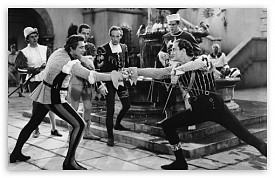Enemies of Love
One of the most shocking things about the Gospel is the Lord’s commandment to love our enemies. To quote Huck Finn, “it don’t seem natural.” What does seem natural is to love our friends and those “on our side” and to hate our enemies, including all those who are unlike us or in some way opposed to us. Yet there it is, and there’s no getting around it. The Lord doesn’t allow us to rest on our laurels when we’ve managed to love those who love us; instead He demands a far greater test of love: to love those who hate us, or whom we are tempted to hate. This, it would seem, is impossible for us. Nevertheless it is what we are commanded.
The problem is even deeper, though. It is not only our obvious enemies that are impossible for us to love as we ought. Even those nearest and dearest to us are in some sense our enemies; they are the enemies of our ego. The fallen ego is conceited and can’t stand to have any competition. Every act of selfless love toward another – even the most loveable person – is an affront to the ego, and so it requires resisting the ego’s desires. So we have a fight on our hands, and the enemy is not who we thought it was. People created in the image of God, whether they hate us or love us, are not our real enemies; our enemies are those forces within and without that seek to rob us of our love.
Indeed, the fallen ego has allies that come from without and reinforce that old selfishness. They are thoughts from hades, which whisper to us very convincingly that we should trust them and be suspicious of other people. They undermine love in a variety of ways. For example, a thought comes to me to accusing someone of something and rousing negative feelings in me. Another thought comes praising me for something I’ve done, provoking in me a sense of self-importance. A third thought comes comparing me to someone else, and saying, “you may not be perfect, but at least you’re not as bad as that person.”
These thoughts are the enemies of love. Such thoughts lurk and prowl, and strike when they find us vulnerable. If we make friends with these intruders, love departs. It can’t return until with God’s help we drive the intruders out. We are engaged in a fierce warfare, and the prize we fight for is love. When it is present in the heart, love is itself the greatest weapon for good, combining the potency of all the other virtues.
St. Mark the Ascetic says that “Christ’s words that the ‘first will be last and the last will be first’ refer to those who participate in the virtues and those who participate in love. For love is the last of the virtues to be born in the heart, but it is the first in value, so that those born before it turn out to be the ‘last.’” In other words, love is the crown of the virtues, and the cultivation of real love in us involves struggling against all our passions. It is the “last” of the virtues because in its perfect form it comes to dwell in us only after we have humbled ourselves, learned patience, resisted selfishness, controlled our appetites, and so on.
Sound impossible? It is. But “with God all things are possible,” and some things are even probable. What could be more probable than God’s helping us to become what we are meant to be? That is, having the energy of Divine love at work within us and among us. We have to be prepared for a fight, of course; but if there’s anything that’s worth fighting for, this is it.
|
| ||||||||||||


 Find us on Facebook
Find us on Facebook Orthodoxy in America
Orthodoxy in America


